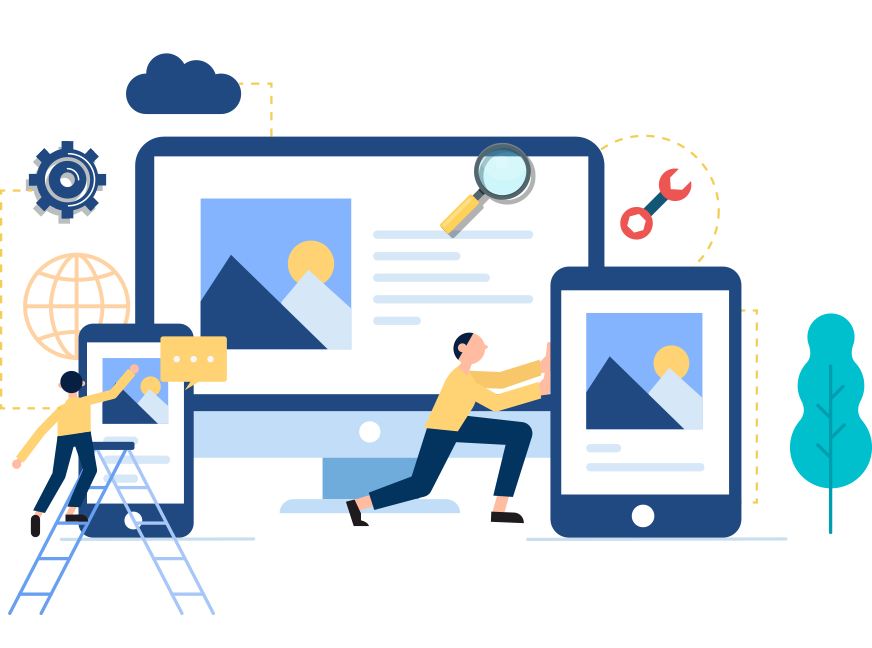It is no exaggeration to suggest that in today’s business climate, digital transformation(DX) has become crucial to growth. However, it is also the final stage of a widely misunderstood method. We explore how everyday firms will profit from today’s digital environment in this series of posts, using a strong and highly available collection of resources.
You are not alone if you do not know what digital transformation is. This main word, though, is something that should be focused on as quickly as possible for all corporations. The world is developing. Around the same time, global communication puts the globe closer together, showcasing what makes everyone and everything different. Companies would be left behind who have not adopted the digital change.
Accepting and progressing towards digital change does not necessarily mean hopping on the bandwagon of technology that comes along. Using it is like throwing in a pot a lot of chopped up vegetables and naming it soup. You will never make soup, at least not soup that anyone needs to eat until you place the right ingredients in the pot and turn on the burner. Instead, each enterprise needs to spend some time worrying about what it actually means to them for digital transformation.
 In addition, their employees may be used to the current way things are and have their hands too full to want to sit down and learn a whole new method. And if certain workers are already planning to retire or move on in a few years, then their employers will prefer for the time being to only let them run their own corner of the organization in peace. Companies prefer to let inertia take over in certain cases, pushing the can further down the road so they can later deal with the crisis.
But, particularly during this time of rapid economic transition, inertia is a bad business strategy. Almost every big growth, in all sectors, has been fueled by digital disruption in recent years. Under such a background, it is the most dangerous of all tactics to avoid modernization by delaying the most essential market improvements.
In fairness, conventional means of correspondence and storing of information were actually necessary to suit their original function. But the launch of modern computing opened amazing new doors, enabling corporations to see what they were losing if they tried to do stuff the same way.
No matter how relaxed you might be doing stuff the old way, it is simpler than you might think to make the transition to digital. It is easy to master well-designed programming programs with ease and can reduce the workload on your workers. Digitization helps corporations to save money on wages in the long term by allowing for improved productivity. Your team would undoubtedly now be happier, as they have better resources to work with and will also invest more time in creative thinking, problem-solving, client engagement, and innovative opportunities to produce value.
Digitization alone will not turn the business into Amazon, but it is the first step towards a sustainable 21st-century organization that is important. Customers and customers perceive the benefits only indirectly; in the process, public-facing technologies arrive a little later. Yet in terms of the internal processes of the company, digitization is about creating your own organizational infrastructure. Owing to outstanding process upgrades, it helps you to meet your existing goals quicker and more accurately.
In addition, their employees may be used to the current way things are and have their hands too full to want to sit down and learn a whole new method. And if certain workers are already planning to retire or move on in a few years, then their employers will prefer for the time being to only let them run their own corner of the organization in peace. Companies prefer to let inertia take over in certain cases, pushing the can further down the road so they can later deal with the crisis.
But, particularly during this time of rapid economic transition, inertia is a bad business strategy. Almost every big growth, in all sectors, has been fueled by digital disruption in recent years. Under such a background, it is the most dangerous of all tactics to avoid modernization by delaying the most essential market improvements.
In fairness, conventional means of correspondence and storing of information were actually necessary to suit their original function. But the launch of modern computing opened amazing new doors, enabling corporations to see what they were losing if they tried to do stuff the same way.
No matter how relaxed you might be doing stuff the old way, it is simpler than you might think to make the transition to digital. It is easy to master well-designed programming programs with ease and can reduce the workload on your workers. Digitization helps corporations to save money on wages in the long term by allowing for improved productivity. Your team would undoubtedly now be happier, as they have better resources to work with and will also invest more time in creative thinking, problem-solving, client engagement, and innovative opportunities to produce value.
Digitization alone will not turn the business into Amazon, but it is the first step towards a sustainable 21st-century organization that is important. Customers and customers perceive the benefits only indirectly; in the process, public-facing technologies arrive a little later. Yet in terms of the internal processes of the company, digitization is about creating your own organizational infrastructure. Owing to outstanding process upgrades, it helps you to meet your existing goals quicker and more accurately.
 Digitalization is how corporations seem to understand who you are. You may have purchased flight tickets to Tokyo once, and then seen some ads in your web browser afterward, suggesting hotels to stay in Japan, or the top sightseeing areas around Mt. Fuji. Digitalization functions in a similar manner: it is possible to seamlessly merge sales information and customer information, then send it to the marketing department, which in turn uses algorithms to produce specially designed advertising to spark your curiosity.
The more structured your knowledge is inside your internal computers, the more it can be incorporated, evaluated, and incorporated to simplify activities that would otherwise take time. Taken together, these improvements reflect a generational jump over non-digital practices, in which data is hand-processed by workers, corporate messages and ads are delivered in bulk without being personalized, and manual labor depends on assembly lines.
Digitalization is how corporations seem to understand who you are. You may have purchased flight tickets to Tokyo once, and then seen some ads in your web browser afterward, suggesting hotels to stay in Japan, or the top sightseeing areas around Mt. Fuji. Digitalization functions in a similar manner: it is possible to seamlessly merge sales information and customer information, then send it to the marketing department, which in turn uses algorithms to produce specially designed advertising to spark your curiosity.
The more structured your knowledge is inside your internal computers, the more it can be incorporated, evaluated, and incorporated to simplify activities that would otherwise take time. Taken together, these improvements reflect a generational jump over non-digital practices, in which data is hand-processed by workers, corporate messages and ads are delivered in bulk without being personalized, and manual labor depends on assembly lines.
 With the worldwide mobile first strategy and consumers depending heavily on the use of mobile technology, the only way to beat the market and engage with customers is to incorporate mobile apps into company strategies.
With the worldwide mobile first strategy and consumers depending heavily on the use of mobile technology, the only way to beat the market and engage with customers is to incorporate mobile apps into company strategies.
 The growth of web apps is only rising, since they are able to leverage the market infrastructure of an organisation and open up new revenue streams through digital cost reduction solutions.
Web applications will dramatically boost CX, providing the smooth journeys people want from online consumer tools to advanced CRM systems.
The growth of web apps is only rising, since they are able to leverage the market infrastructure of an organisation and open up new revenue streams through digital cost reduction solutions.
Web applications will dramatically boost CX, providing the smooth journeys people want from online consumer tools to advanced CRM systems.
Digitization along with digitalization
Such similar-sounding terms mask essential differences that are relevant to the modern enterprise. While most enterprises recognize that the benefits of upgrading to the modern world are, a much smaller percentage can explicitly express what happens next or why their company’s destiny can depend on it. With that in mind, one stage at a time, let’s see what a path into the modern world will look like for your business. We’re even going to spend a few extra moments showing you what the final destination feels like, and why it constitutes such a monumental upgrade from where this trip started.Digitization
This move entails taking knowledge and putting it on computers from the brick-and-mortar environment. It involves replacing pens with keyboards, post-it notes with emails, and filing cabinets with spreadsheets in realistic terms. Any department in your organization becomes easier to manage, view, and reference as needed by keeping your documents in digital form, and an electronic record is kept any time you press ‘submit’. Most organizations, at least for their internal library of material, have reached this level. However, a surprising number have left this objective only partly accomplished. In addition, their employees may be used to the current way things are and have their hands too full to want to sit down and learn a whole new method. And if certain workers are already planning to retire or move on in a few years, then their employers will prefer for the time being to only let them run their own corner of the organization in peace. Companies prefer to let inertia take over in certain cases, pushing the can further down the road so they can later deal with the crisis.
But, particularly during this time of rapid economic transition, inertia is a bad business strategy. Almost every big growth, in all sectors, has been fueled by digital disruption in recent years. Under such a background, it is the most dangerous of all tactics to avoid modernization by delaying the most essential market improvements.
In fairness, conventional means of correspondence and storing of information were actually necessary to suit their original function. But the launch of modern computing opened amazing new doors, enabling corporations to see what they were losing if they tried to do stuff the same way.
No matter how relaxed you might be doing stuff the old way, it is simpler than you might think to make the transition to digital. It is easy to master well-designed programming programs with ease and can reduce the workload on your workers. Digitization helps corporations to save money on wages in the long term by allowing for improved productivity. Your team would undoubtedly now be happier, as they have better resources to work with and will also invest more time in creative thinking, problem-solving, client engagement, and innovative opportunities to produce value.
Digitization alone will not turn the business into Amazon, but it is the first step towards a sustainable 21st-century organization that is important. Customers and customers perceive the benefits only indirectly; in the process, public-facing technologies arrive a little later. Yet in terms of the internal processes of the company, digitization is about creating your own organizational infrastructure. Owing to outstanding process upgrades, it helps you to meet your existing goals quicker and more accurately.
In addition, their employees may be used to the current way things are and have their hands too full to want to sit down and learn a whole new method. And if certain workers are already planning to retire or move on in a few years, then their employers will prefer for the time being to only let them run their own corner of the organization in peace. Companies prefer to let inertia take over in certain cases, pushing the can further down the road so they can later deal with the crisis.
But, particularly during this time of rapid economic transition, inertia is a bad business strategy. Almost every big growth, in all sectors, has been fueled by digital disruption in recent years. Under such a background, it is the most dangerous of all tactics to avoid modernization by delaying the most essential market improvements.
In fairness, conventional means of correspondence and storing of information were actually necessary to suit their original function. But the launch of modern computing opened amazing new doors, enabling corporations to see what they were losing if they tried to do stuff the same way.
No matter how relaxed you might be doing stuff the old way, it is simpler than you might think to make the transition to digital. It is easy to master well-designed programming programs with ease and can reduce the workload on your workers. Digitization helps corporations to save money on wages in the long term by allowing for improved productivity. Your team would undoubtedly now be happier, as they have better resources to work with and will also invest more time in creative thinking, problem-solving, client engagement, and innovative opportunities to produce value.
Digitization alone will not turn the business into Amazon, but it is the first step towards a sustainable 21st-century organization that is important. Customers and customers perceive the benefits only indirectly; in the process, public-facing technologies arrive a little later. Yet in terms of the internal processes of the company, digitization is about creating your own organizational infrastructure. Owing to outstanding process upgrades, it helps you to meet your existing goals quicker and more accurately.
Digitalization
According to Boris Dehtiar Senior Client Advisor at 247 Labs, Digitalization refers to the automation of business operations based on the knowledge you have already processed in the database system, as the next logical step forward. With the assistance of software applications programmed to execute specific functions, bookkeeping, accounting, manufacturing, procurement, internet ordering processes, customer contact, these and many other customer-facing and back-office practices can be managed effectively. Although the data are fed into separate computer networks for each department in the previous process, digitalization now requires it to be merged into a common network, which in turn follows a standardized format used by computer systems worldwide. Such a jump in performance, known as Robotic Process Automation (RPA), helps the business to benefit from best practises around the world, and continue to evolve as new methods are found and perfected. This move is also followed by advancements in encryption, as cloud computing technologies will now encrypt business data. We will begin to see several new and advanced possibilities coming into view at this point. Output can be vastly improved by installing the necessary automation machinery in your factories. It is possible to leave product diagnostics and quality management primarily in the hands of computers that operate quicker and more reliably than even the most skilled humans. Digitalization is how corporations seem to understand who you are. You may have purchased flight tickets to Tokyo once, and then seen some ads in your web browser afterward, suggesting hotels to stay in Japan, or the top sightseeing areas around Mt. Fuji. Digitalization functions in a similar manner: it is possible to seamlessly merge sales information and customer information, then send it to the marketing department, which in turn uses algorithms to produce specially designed advertising to spark your curiosity.
The more structured your knowledge is inside your internal computers, the more it can be incorporated, evaluated, and incorporated to simplify activities that would otherwise take time. Taken together, these improvements reflect a generational jump over non-digital practices, in which data is hand-processed by workers, corporate messages and ads are delivered in bulk without being personalized, and manual labor depends on assembly lines.
Digitalization is how corporations seem to understand who you are. You may have purchased flight tickets to Tokyo once, and then seen some ads in your web browser afterward, suggesting hotels to stay in Japan, or the top sightseeing areas around Mt. Fuji. Digitalization functions in a similar manner: it is possible to seamlessly merge sales information and customer information, then send it to the marketing department, which in turn uses algorithms to produce specially designed advertising to spark your curiosity.
The more structured your knowledge is inside your internal computers, the more it can be incorporated, evaluated, and incorporated to simplify activities that would otherwise take time. Taken together, these improvements reflect a generational jump over non-digital practices, in which data is hand-processed by workers, corporate messages and ads are delivered in bulk without being personalized, and manual labor depends on assembly lines.
The role of digital transformation
There is yet another jump to be taken for all of the advantages provided by the previous point. Through applying Data & Resource Digitalization for information management, a Linked Business environment for seamless teamwork, and a thorough overhaul to meet consumer and customer demands, modern transformation(DX) can be accomplished. In reality, combining these elements transforms the corporate model of an organization at a fundamental level, and reflects the culmination of innovation in the business world of today. Digital transformation makes the public-facing channels of an organization interactive and open to feedback in real-time. For instance, Uber (or Grab) takes digitized company info, such as who and where its available drivers are, and delivers it on-demand to customers. Airbnb takes a similar strategy, explaining to customers, each of whom it remembers, its ‘stock’ of homes. This way, to have the exact product (or information) the consumer is searching for, the user interface is completely customized. The true reach and potential of the current digital revolution can be understood as opposed to the narrow possibilities of only a decade earlier, such as the discrete digitization of closed systems. The modern digital value chain allows organized collections of systems to be implemented seamlessly but places the customer interface at the core. It maximizes customization possibilities while retaining enhanced efficacy at all stages. It profits entirely from the Digitalization of Data and Properties, a Connected Enterprise paradigm, and a renewed emphasis on consumer and customer needs, opening the door to long-term growth in the industry. There are also the employees of the company to remember, beyond the technological implications of each move. Employee engagement is important from the very beginning, from conceptualizing each upgrade’s execution to deciding on the realistic targets for each point. On an ongoing basis, preparation and recruiting will need to be organized to ensure that both motivation and capacity remain at high standards throughout the journey. Prior to the start of the movement into a new stage of digital upgrades, various technological and strategic issues will need to be addressed. Technology, platform, and interface issues would depend on the company’s areas of greatest need.Digital disruption and focus on the customer
Another keyword that explains what digital change can achieve in society at large is digital disruption. Disruption was caused by smartphones, Uber created a disruption, and disruptions continue to be produced by wearable technology. The everyday lives of customers change a little further with each main technical innovation. The standard is shaken up, and the market value is added by progression. In order to satisfy the demands of the customer, companies who take advantage of the technological trends, and that understand how these changes affect everyday life, will adjust their activities.Planning ahead with digital transformation
Digital transformation is both an end product and a process that is continuing. The initial move must be made, and then you must continue to develop or be pushed out. Digital transition does not have a simple remedy. When you sit down to explore the digital future of your business with your colleagues, think in the immediate future, but also your company’s long-term ambitions. You would need to introduce digital technologies to retain relevance and keep the business going forward into the digital age and not standing still or moving backward. Think of the company experience at each level. To streamline in-house processes, what should you implement? To promote consumer connections, what can you implement? The main factors that will guide your digital transition are these. That could mean introducing an automated payment solution for certain businesses so that consumers can connect to an online platform and pay their bills. For some, it may involve jumping into social media and frequently sharing related content. The digital revolution is part of every transition to the digital space. The digital experience will change over the long term. How do you make it easy to alter an aspect of the business process? To move the direction of the organization away from legacy market practices and to a more technology focused future, openness, a community mission toward digital relevance, and continue listening to consumer habits may all be relevant. The digital revolution is far from done until you have gotten the ball rolling. Digital transformation should be a key market concern, whether you run a small yogurt shop or a billion-dollar tech startup. It is as essential to profitability as the factors of money, overhead, and promotion are.Mobile applications as digital transformation
Many business analysts also see smartphone apps rather than being a gateway to digital transformation as an individual body. That makes an immense difference. In the digital development approach, intelligent executives include smartphone applications to redesign the way they operate. The following chart provides information on the growth of digital transformations by solutions, and it is clear that mobile app development growth, along with cloud storage, research and so on, will be stagnating in the next few years. The introduction of smartphones has radically changed the market world and opened the doors to new possibilities. Companies may only use smartphone platforms to stay tuned to consumers. With the worldwide mobile first strategy and consumers depending heavily on the use of mobile technology, the only way to beat the market and engage with customers is to incorporate mobile apps into company strategies.
With the worldwide mobile first strategy and consumers depending heavily on the use of mobile technology, the only way to beat the market and engage with customers is to incorporate mobile apps into company strategies.
Web applications as a part of digital transformation
New to the scene, somewhere between a traditional web interface and a smartphone app, the radical web application is. A progressive web application is designed like a web application, operates on a browser and does not need an app store to download. However, a progressive Web interface also encourages new innovations to be introduced, such as offline features, synchronised capabilities and the possibility to update them on your smartphone or tablet’s home screen. Google Chat is the prime example of an advanced software programme. The production of apps is now an affordable choice for many SMEs, no longer confined to the e-commerce titans’ budgets. The growth of web apps is only rising, since they are able to leverage the market infrastructure of an organisation and open up new revenue streams through digital cost reduction solutions.
Web applications will dramatically boost CX, providing the smooth journeys people want from online consumer tools to advanced CRM systems.
The growth of web apps is only rising, since they are able to leverage the market infrastructure of an organisation and open up new revenue streams through digital cost reduction solutions.
Web applications will dramatically boost CX, providing the smooth journeys people want from online consumer tools to advanced CRM systems.






